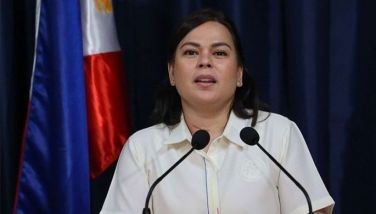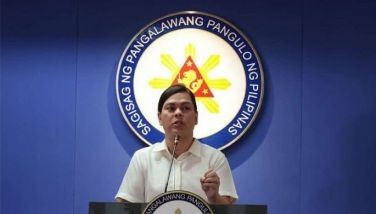Trump 2.0 and the Philippines

“America has given us an unprecedented and powerful mandate,” Donald Trump happily announced on election night.
It hasn’t even been a month and already we are witnessing the winds of change blowing strong after Donald Trump’s decisive political comeback, with 312 electoral votes and 74.6 million votes.
And when America sneezes, the world catches a cold.
Last Tuesday, President Ferdinand Marcos Jr. called the newly elected 47th US President to personally congratulate the latter. PBBM described the phone conversation as “very friendly” and “very productive” and he later told Palace reporters that he plans “to meet Trump as soon as he can.” As of this writing, no invitation to visit Washington has been extended to Marcos Jr.
In the same phone conversation, PBBM reminded the incoming American president that Filipino Americans “overwhelmingly voted for him” and, to quote PBBM, “I’m sure he will remember that.”
On the other hand, even before fPRRD sent his congratulatory letter, he openly campaigned for Donald Trump’s election. PRRD even condemned the failed assassination attempt against then Republican candidate Trump at a campaign rally in Pennsylvania.
While PRRD did not pay obeisance to the US President, it is no secret there was mutual admiration between the two leaders borne out of trust and respect.
The American president lavishly praised the Filipino president’s war on drugs, saying the latter is doing “an unbelievable job.” Trump even invited Duterte to the White House before the outbreak of the COVID-19 pandemic.
I therefore view PRRD as a big winner in Trump’s electoral victory.
The case of Marcos Jr. is, however, different. Two years in power, PBBM made the Philippines a US puppet state transforming our country to Asia’s Ukraine. PBBM, goaded by the US under the outgoing Biden administration, quarreled with China, our biggest trading partner.
What will happen to PBBM and the Philippines under the second Trump administration?
As a starter, PBBM must gain the respect and trust of president-elect Trump – not his usual way of making the Philippines a vassal state of the United States.
The question is: how?
We can take the cue from American billionaire investor Ray Dalio. In an article published by Time magazine last Wednesday, Nov. 20, 2024 entitled, “How A Second Trump Administration Will Change the Domestic and World Order,” Dalio cited Trump’s geopolitical shift with his “America First” policy, where allies will be chosen based on strategic needs, and not shared values, as a significant change expected in the incoming Trump administration.
For Trump, America First means protecting American interests and prioritizing its domestic economy.
To set things in their proper perspective, we have seen America First in the first Trump administration, and it did not mean an isolated America or America alone.
It simply means America building up its strength or, as his 2024 campaign slogan puts it, “making America great again.”
It means America scaling back in global affairs.
Trump, the first US president with no prior political and military experience, once called Russian President Vladimir Putin a “genius” and described Chinese President Xi Jinping as “brilliant.”
With his background as a tough, successful businessman, we thus expect Trump’s second stint at the Oval Office to be pragmatic and transactional as well.
Trump’s approach is strengthening relationships with allies while creating new opportunities to work with them.
A case in point is NATO, where Trump underscored the importance of clear and fair burden sharing between the United States and its allies in their collective defense efforts.
Having said this, PBBM should look how the Philippines can contribute to its alliance with the United States and make America great again.
It is no longer the Philippines as the United States’ oldest ally in the Indo-Pacific. It is more than shared values – on how both countries can contribute on their respective strategic needs.
Remember, PBBM will be dealing with a businessman-turned-president.
As such, Trump wants competition – not war – with China.
And with Trump’s pragmatic and transactional style, PBBM needs to demonstrate and sell the Philippines’ strategic importance.
It is noteworthy to mention that during the first Trump administration, the United States has scaled down its involvement in global affairs, we therefore expect the same situation happening during the second Trump administration.
Issues like tension in the West Philippine Sea will take a backseat in American foreign policy.
Let me remind our dear readers that the US-China conflict is a powder keg which can explode any time, and the Philippines is in the middle of this tug-of-war.
We cannot claim neutrality in this regard when we preposition troops and facilities within our territory for possible offensives against another state.
Since 2014, I have voiced my strong opposition against the Enhanced Defense Cooperation Agreement (EDCA) and its constitutionality. I have argued that the new EDCA sites that have been hosted during the PBBM administration will harm Philippine interest and regional stability.
For this sole reason alone, I am happy that Trump won.
Going back, what, then, will be the Philippines’ unique selling point to the United States?
It is our strategic geographical location in Asia and our proximity to China, America’s biggest creditor and one of its largest trading partners.
We go back again to China. This is the reality we have to face and accept.
With a new US president with zero interest in war and conflict, we are hopeful that the inflammatory rhetoric of Filipino officials will simmer.
While I do not expect our relationship with China to reach a high point much like during the Duterte administration, I would like to see our bilateral relations with both countries to benefit us in terms of uplifting the quality of life of Filipinos.
Hope springs eternal after all.
- Latest
- Trending



























